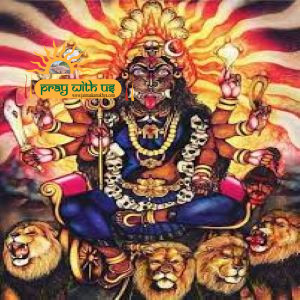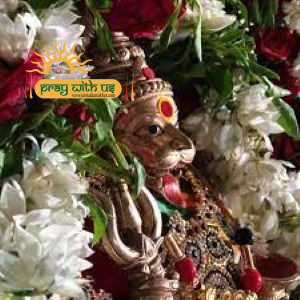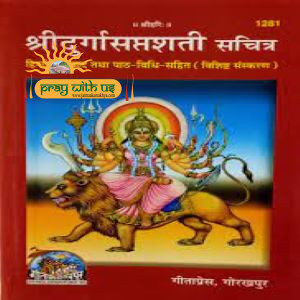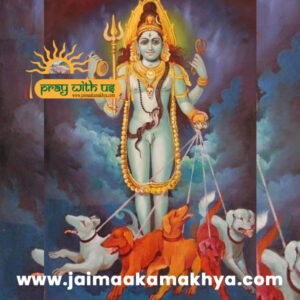Pratyangira Devi Puja Online for Protection & Negativity Removal
Original price was: ₹11,000.00.₹4,500.00Current price is: ₹4,500.00.
Devi Pratyangira is the one who reverses any black magic attacks. Pratyangira Devi is also called Atharvana Bhadrakali, Narasimhi and Simhamukha Lakshmi is a Hindu Goddess associated with Shakti. Pratyangira is an incarnation of Goddess Chandi/Durga and the divine tattva energy of Lord Narasimha, an incarnation of Lord Vishnu.
Pratyangira Devi Puja – Divine Protection, Fear Removal & Spiritual Shielding
Pratyangira Devi Puja is a powerful devotional ritual dedicated to Pratyangira, the fierce and protective form of Adi Shakti worshipped for spiritual protection, removal of intense negativity, and inner courage. Revered in Shakti traditions, Maa Pratyangira symbolizes the destruction of fear, negative influences, and harmful vibrations, while blessing devotees with strength, peace, and stability.
At Jai Maa Kamakhya, Pratyangira Devi Puja is performed with pure sankalp, disciplined mantra chanting, and strict ethical guidelines, focusing only on protection, cleansing, and spiritual balance—never harm, revenge, or unethical intent.
What Is Pratyangira Devi Puja?
Pratyangira Devi is considered a guardian energy in spiritual traditions, invoked for protection against intense negativity, fear, mental disturbance, and unseen obstacles. This puja is conducted to create a protective spiritual shield, purify the aura, and restore calmness and confidence in life.
This ritual is rooted in devotion, purity, and spiritual discipline, not fear-based practices.
Benefits of Pratyangira Devi Puja
-
🛡️ Strong spiritual protection and shielding
-
🌿 Removal of negative energy and disturbances
-
🧠 Mental peace, courage, and emotional stability
-
🔥 Inner strength during difficult life phases
-
🙏 Divine blessings for fearlessness and clarity
-
⚖️ Balance, positivity, and spiritual grounding
Benefits are faith-based and gradual, depending on belief, mindset, and ethical intention.
How Pratyangira Devi Puja Is Performed
-
Sacred sankalp taken with devotee’s name and intention
-
Chanting of Pratyangira Devi mantras and protection prayers
-
Devotional offerings performed with discipline and purity
-
Rituals focused on cleansing and spiritual protection
-
Available as online Pratyangira Devi Puja
All rituals are performed responsibly with a peaceful and protective intention.
Who Should Perform Pratyangira Devi Puja?
This puja is suitable for those who:
-
Feel surrounded by negativity or fear
-
Experience mental unrest or repeated obstacles
-
Seek spiritual protection and inner strength
-
Want peace, clarity, and emotional stability
-
Believe in Shakti-based devotional remedies
❗ This puja is not meant for harming others or unethical control.
Online Pratyangira Devi Puja – Trusted Across India & Worldwide
You can book Pratyangira Devi Puja online from anywhere. The puja is performed with proper sankalp for devotees across India and internationally USA, UK, Australia, Canada, Mauritius, UAE .
Trusted Pratyangira Devi Puja services from India, serving devotees in Delhi, Mumbai, Kolkata, Bengaluru, Chennai, Assam, and worldwide.
Why Choose Jai Maa Kamakhya?
-
✔️ Authentic Shakti and Mahavidya traditions
-
✔️ Ethical, protection-focused rituals
-
✔️ Experienced and disciplined practitioners
-
✔️ Confidential and respectful spiritual guidance
-
✔️ Trusted online puja service from India
Book Pratyangira Devi Puja Today
Invoke divine protection, courage, and peace through Pratyangira Devi Puja, performed responsibly for spiritual cleansing and energetic balance.
🙏 May Maa Pratyangira bless you with fearlessness, protection, and inner strength.
🔹 Powerful Pratyangira Devi Puja Mantras
(For devotional and protective chanting only)
🔸 1. Pratyangira Beej Mantra
ॐ क्षं प्रट्यंगिरायै नमः
(Om Ksham Pratyangirayai Namah)
Purpose: Protection, fear removal, and spiritual shielding
🔸 2. Narasimha–Pratyangira Protection Mantra
ॐ उग्रं वीरं महाविष्णुं ज्वलन्तं सर्वतोमुखम्
Purpose: Courage, protection, and removal of fear
🔸 3. Universal Shanti Mantra
ॐ शान्तिः शान्तिः शान्तिः
Purpose: Peace, calmness, and mental stability
Chanting Guidance:
-
Best Day: Tuesday or Saturday
-
Count: 108 times
-
Intention: Pure, peaceful, and non-harmful
🔹 FAQs
Q1. What is Pratyangira Devi Puja?
Pratyangira Devi Puja is a spiritual ritual performed for protection, removal of negativity, and mental peace through Shakti worship.
Q2. Is Pratyangira Devi Puja safe and ethical?
Yes, when performed with pure intention, it is a protective and peaceful spiritual practice.
Q3. Can Pratyangira Devi Puja be done online?
Yes, the puja can be performed online with proper sankalp and traditional rituals.
Q4. Who should perform Pratyangira Devi Puja?
Anyone seeking protection from negativity, fear, or mental disturbance can perform this puja.
Q5. Does this puja harm anyone?
No, it is strictly focused on protection, cleansing, and spiritual balance.
Q6. How long does Pratyangira Puja take?
The duration depends on the ritual method but generally ranges from a few hours to a full day.
Q7. Is kundali required for this puja?
Kundali is optional but can help in personalized spiritual guidance.
Q8. What are the benefits of Pratyangira Devi worship?
It promotes courage, protection, emotional strength, and spiritual peace.
Q9. Which mantra is used in Pratyangira Devi Puja?
Common mantras include “Om Ksham Pratyangirayai Namah” and other Shakti protection mantras.
Q10. Why choose Jai Maa Kamakhya for Pratyangira Devi Puja?
Because of authentic rituals, ethical practices, and trusted online puja services rooted in Indian spiritual tradition.







Reviews
There are no reviews yet.